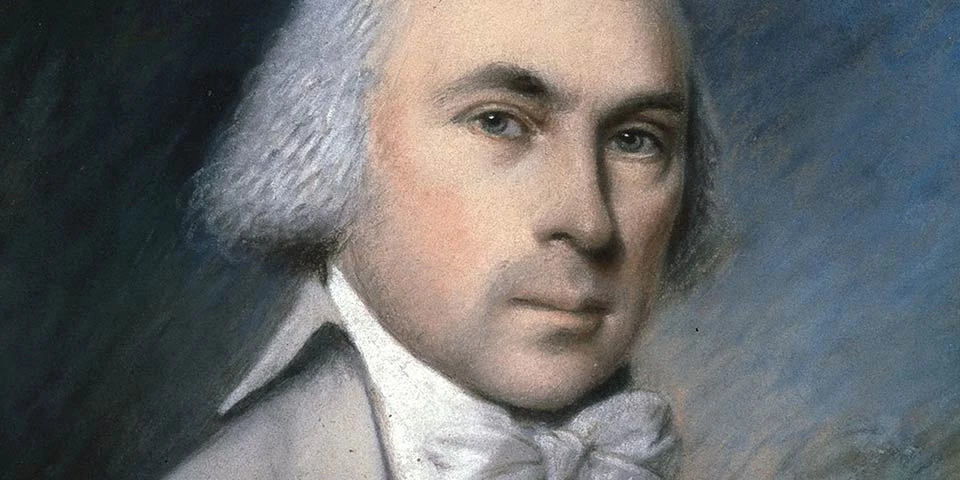Part of a series of articles titled The Constitutional Convention: A Day by Day Account for June 1787.
Article
June 8, 1787: Veto Powers

James Madison by James Sharples Sr., 1796-1797. Independence National Historical Park
"It is impossible that the articles of confederation can be amended - they are too tottering to be invigorated - nothing but the present system, or something like it, can restore the peace and harmony of the country."
--James Madison, recorded in Robert Yates' Secret Proceedings and Debates of the Constitutional Convention
Friday, June 8, 1787: The Convention Today
The Convention, meeting in the Committee of the Whole, reconsidered the provision giving the national legislature a veto over State laws "contrary to the articles of Union, or Treaties with foreign nations." Charles Pinckney (SC), seconded by James Madison(VA), moved to strike the qualifying clause and thus give the legislature power to veto any state law.
Madison, James Wilson (PA) and John Dickinson (DE) spoke in support of the motion. Elbridge Gerry (MA) and Roger Sherman (CT) thought it went too far, though Gerry thought Congress should have an exclusive right to issue paper money. Hugh Williamson (NC), Gunning Bedford (DE) and Pierce Butler (SC) vehemently opposed the motion; Bedford because he viewed it as a further attack on the small states, Butler because he viewed it as against the interests of the more distant states. The motion was defeated 3 ayes (MA, PA, VA), 7 no's, 1 (DE) divided.
Dickinson of Delaware has proposed the states elect the Senators, yet he still would give the national legislature the power to overrule state laws. Dickinson's fellow Delawarean Gunning Bedford saw this as an attack on the small states.
Synopsis
Delegates Today
The Convention, meeting in the Committee of the Whole, reconsidered the provision giving the national legislature a veto over State laws "contrary to the articles of Union, or Treaties with foreign nations." Charles Pinckney (SC), seconded by James Madison(VA), moved to strike the qualifying clause and thus give the legislature power to veto any state law.
Madison, James Wilson (PA) and John Dickinson (DE) spoke in support of the motion. Elbridge Gerry (MA) and Roger Sherman (CT) thought it went too far, though Gerry thought Congress should have an exclusive right to issue paper money. Hugh Williamson (NC), Gunning Bedford (DE) and Pierce Butler (SC) vehemently opposed the motion; Bedford because he viewed it as a further attack on the small states, Butler because he viewed it as against the interests of the more distant states. The motion was defeated 3 ayes (MA, PA, VA), 7 no's, 1 (DE) divided.
Dickinson of Delaware has proposed the states elect the Senators, yet he still would give the national legislature the power to overrule state laws. Dickinson's fellow Delawarean Gunning Bedford saw this as an attack on the small states.
Synopsis
- Defeated (7 – 3 – 1) a motion by Madison and C. Pinckney to give the national legislature power to veto any state law
Delegates Today
- William Few observed his 39th birthday. One of the least active members of the Convention, Few presented his credentials on May 25, was elected to the Committee of eleven on preventing discrimination between ports in trade regulations on August 25, and signed the U.S. Constitution on September 17. Otherwise, he is absent from extant Convention records.
- Mr. John Brown, visiting in Philadelphia from Kentucky, wrote home, describing a party at Robert Morris' home, and giving us a glimpse of the hospitality of upper class Philadelphia: "We spent last evening with Mr. Robert Morris - whose political character you must be somewhat acquainted with. He is a large fat man, very sociable & easy in his manners. The party at his house consisted of about forty of both sexes; no language I am master of could convey an idea of the elegance of the entertainment. Mr. Morris' house is furnished in a stile superior to anything I have ever seen..."
Last updated: July 24, 2019
